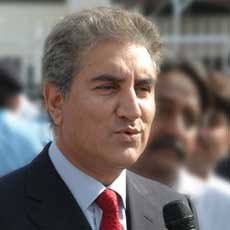Pakistan foreign minister claims India supports insurgents
 Islamabad - Pakistani Foreign Minister Shah Mehmood Qureshi has accused India of supporting insurgents in Pakistan, including areas bordering Afghanistan.
Islamabad - Pakistani Foreign Minister Shah Mehmood Qureshi has accused India of supporting insurgents in Pakistan, including areas bordering Afghanistan.
Speaking with the German Press Agency dpa, Qureshi claimed that Pakistan was "compiling hard evidence of India's involvement and interference in Baluchistan and FATA."
The FATA (the Federally Administered Tribal Areas) consists of eight districts along the Afghan border that have been plagued by Islamic militancy.
In Baluchistan, a province in Pakistan's south-west, rebels rose up against the central government in 2004, demanding autonomy and a greater share of the profits from the region's natural resources.
Hundreds have died in bomb attacks and raids carried out by the insurgents as well as by retaliatory actions by the country's military and paramilitary troops.
Pakistani military and civilian leadership have repeatedly alleged that India has been supporting the Tehrik-e-Taliban Pakistan (TTP) group, an umbrella organization of more than a dozen Islamic militant groups that is believed to be behind several dozen suicide attacks since 2007 from its heartland in the FATA district of South Waziristan.
"India should refrain from such nefarious activities," said Qureshi, speaking of India' alleged support of militants.
"Unless (India) dispenses with its visceral animosity towards Pakistan, attaining viable peace and security in South Asia will be even more elusive," he added.
The statement came two weeks after Pakistani Information Minister Qamara-uz-Zaman Kaira and an army spokesman, Major General Athar Abbas, told reporters that Pakistan had concrete evidence of Indian involvement in the South Waziristan militancy.
Abbas said a huge quantity of Indian arms and ammunition, medical equipment and medicines used by Taliban militants had been recovered from the restive district.
Neighbouring India and Pakistan have fought three wars since their independence from Britain in 1947, with India invading eastern Pakistan in 1971 to support Bengali separatists fighting a guerrilla war against the government in Islamabad, creating present day Bangladesh.
The two other wars were fought in 1948 and 1965 over control of the Himalayan region of Kashmir, which is presently divided between the two countries.
Pakistan is believed to have sponsored armed resistance by Kashmiri separatists in the Indian-administered part of Kashmir.
Five years after becoming nuclear states in 1998, the two countries launched a peace process under pressure from the international community concerned over the prospect of an atomic war devastating the region, home to one fifth of the humanity.
Peace talks starting in early 2004 has been stalled since the 2008 massacre of 166 people over three days in the Indian financial hub of Mumbai allegedly by Pakistan-based Kashmiri separatist group Lashkar-e-Taiba (LeT).
Qureshi complained that India was hesitating over resuming the peace dialogue even though his country was prosecuting the seven LeT members behind the Mumbai massacre.
The trial against them "has now begun and we are pursuing it more vigorously," he said. "It is a very complex trial having both internal and external dimensions."
As the trial goes on, New Delhi should support Islamabad in its efforts against terrorists that have killed thousands of people in several dozen suicide bombings and other strikes across Pakistan, the Pakistani foreign minister urged.
"We believe that sustained engagement and results-oriented dialogue is necessary," said Qureshi. "Breakdown of dialogue only works to the advantage of those who do not want to see peace in the region."
"There is no other alternative. It is for India to respond and reciprocate," he said. "Pakistan stands ready to resume the Composite Dialogue anytime and make lasting peace with India." (dpa)